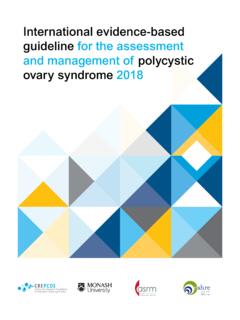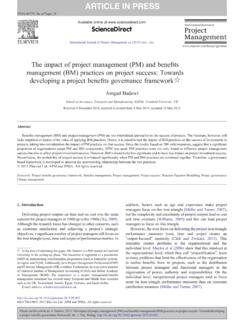Transcription of COMMUNITY SYSTEMS STRENGTHENING RAMEWORK
1 COMMUNITY SYSTEMS STRENGTHENING FRAMEWORK. MAY 2010. i ACRONYMS & ABBREVIATIONS. ACSM Advocacy, communication and social mobilisation AIDS Acquired immune deficiency syndrome CBO COMMUNITY based organisation CSO Civil society organisation CSS COMMUNITY SYSTEMS STRENGTHENING DOTS Directly observed treatment, short course FBO Faith based organisation GF or GFATM Global Fund to fight AIDS, Tuberculosis and Malaria GHI Global health initiatives HIV Human immunodeficiency virus HSS Health SYSTEMS STRENGTHENING M&E Monitoring and evaluation MDGs Millennium Development Goals NGO Non governmental organisation OGAC Office of the Global AIDS Coordinator (US government).
2 PMTCT Prevention of mother to child transmission (of HIV). SDA Service delivery area TB Tuberculosis TWG Technical Working Group UNAIDS Joint United Nations Programme on HIV/AIDS. UNDP United Nations Development Programme UNGASS United Nations Global Assembly Special Session on AIDS. UNICEF United Nations Children's Fund US United States of America USAID United States Agency for International Development WHO World Health organisation ii page CONTENTS. Acronyms & abbreviations i Foreword iv Executive Summary vi 1. COMMUNITY SYSTEMS STRENGTHENING a framework 1. Key terms used in the framework 1. What is the purpose of the CSS framework? 2. Who is this framework for?
3 6. 2. STRENGTHENING COMMUNITY SYSTEMS to contribute to health outcomes 7. What is COMMUNITY SYSTEMS STRENGTHENING ? 7. What needs STRENGTHENING ? 7. What health related activities & services do COMMUNITY SYSTEMS deliver? 10. COMMUNITY SYSTEMS and health SYSTEMS linked and complementary 12. 3. The core components of a functional COMMUNITY system 15. Core component 1: Enabling environments and advocacy 16. SDA 1: Monitoring and documentation of COMMUNITY and government interventions 17. SDA: Advocacy, communication and social mobilisation 18. Core component 2: COMMUNITY networks, linkages, partnerships and coordination 19. SDA 3: Advocacy, Communication and social mobilisation 19.
4 Core component 3: Resources and capacity building 20. Human resources: 20. SDA 4: Skills building for service delivery, advocacy and leadership 21. Financial resources 22. SDA 5: Financial resources 22. Material resources infrastructure, information, essential commodities 23. SDA 6: Material resources infrastructure, information, essential commodities (including 24. medical products and technologies). Core component 4: COMMUNITY activities and services 25. SDA 7: Service availability, use and quality 26. Core component 5: Organisational and leadership STRENGTHENING 27. SDA 8: management , accountability and leadership 27. Core component 6: Monitoring & evaluation and planning 28.
5 SDA 9: Monitoring & evaluation, evidence building 28. SDA10: Strategic and operational planning 31. 4. COMMUNITY SYSTEMS STRENGTHENING in the context of the Global Fund 33. 5. A systematic approach for developing CSS interventions, including monitoring & evaluation 34. 6. Indicators for CSS 38. Development of CSS indicators 38. Overview of recommended CSS indicators 41. Detailed CSS indicator definitions 45. iii 7. Useful resources and references 73. a) Sources of support and technical assistance 73. b) Resources referenced in the CSS Framework 73. iv FOREWORD. The concept of COMMUNITY involvement in improving health outcomes is not a new one. It has its roots in the action that communities have always taken to protect and support their members.
6 Modern approaches to COMMUNITY health care are reflected in the Alma Ata declaration of 19781, the more recent work of WHO on the social determinants of health2 and the re launch of the primary health care concept in 20083. These laid the foundations for much of the work that has been done, highlighting the role of communities in increasing the reach and impact of health SYSTEMS , for example in TB, malaria and HIV care and 5 6It has become increasingly clear that COMMUNITY support for health and social welfare has unique advantages in its close connections with communities, its ability to communicate through people's own culture and language and to articulate the needs of communities, and its ability to mobilise the many resources that COMMUNITY members can bring to the processes of policy and decision making and to service delivery.
7 Further progress is now needed to bring COMMUNITY actors and SYSTEMS into full partnership with national health and social welfare SYSTEMS and in particular to ensure that their work for health is better understood and properly funded. Achieving this goal is vital for making progress towards the goals of universal access to health care and realising the rights of everyone to achieve the highest attainable standards of health, no matter who they are or where they live. The COMMUNITY SYSTEMS STRENGTHENING (CSS) Framework is a contribution towards this. The Global Fund to fight AIDS, Tuberculosis and Malaria developed the Framework in collaboration with a range of stakeholders, supported by a Technical Working Group (TWG) that included: UNAIDS, WHO, UNICEF, World Bank, MEASURE Evaluation, Coalition of the Asia Pacific Regional Networks on HIV/AIDS (7 Sisters), International HIV/AIDS Alliance, USAID Office of HIV/AIDS, and US Office of the Global AIDS Coordinator, UNDP.
8 Burkina Faso, Ministry of Health & Social Welfare Tanzania, Carolyn Green as an independent consultant and Global Fund staff. Finalisation of the draft was supported by a Harmonisation workshop which brought together experts and consultants on monitoring and evaluation as well as an extensive international consultation with civil society, using an online questionnaire, interviews and a two day meeting with key The Framework is primarily aimed at STRENGTHENING civil society engagement with the Global Fund, with a focus on HIV, tuberculosis and malaria. However, a broad health development approach has been taken and the 1. Declaration of Alma Ata International conference on primary health care 1978.
9 2. WHO social determinants of health 3. The World Health Report 2008 primary health care 4. COMMUNITY involvement in tuberculosis care and prevention; WHO 2008. 5. COMMUNITY involvement in rolling back malaria; Roll Back Malaria / WHO 2002. 6. Partnership work: the health service COMMUNITY interface for the prevention, care and treatment of HIV/AIDS; WHO 2002. 7. COMMUNITY SYSTEMS STRENGTHENING Civil Society Consultation; International HIV/AIDS Alliance 2010/ICASO. v Framework will therefore also be useful for working on other health challenges and supporting COMMUNITY engagement in improving health outcomes. EXECUTIVE SUMMARY. The goal of COMMUNITY SYSTEMS STRENGTHENING (CSS) is to develop the roles of key affected populations and communities, COMMUNITY organisations and networks, and public or private sector actors that work in partnership with civil society at COMMUNITY level, in the design, delivery, monitoring and evaluation of services and activities aimed at improving health outcomes.
10 It has a strong focus on capacity building and on human and financial resources, with the aim of enabling communities and COMMUNITY actors to play a full and effective role alongside health and social welfare SYSTEMS . The COMMUNITY SYSTEMS STRENGTHENING Framework has been developed in the light of experience and in recognition of the need for increased clarity and understanding of CSS. It is intended to facilitate increased funding and technical support for CSS, particularly (but not only) for COMMUNITY based organisations and networks. The Framework defines the terminology of CSS and discusses the ways in which COMMUNITY SYSTEMS contribute to improving health outcomes.


















